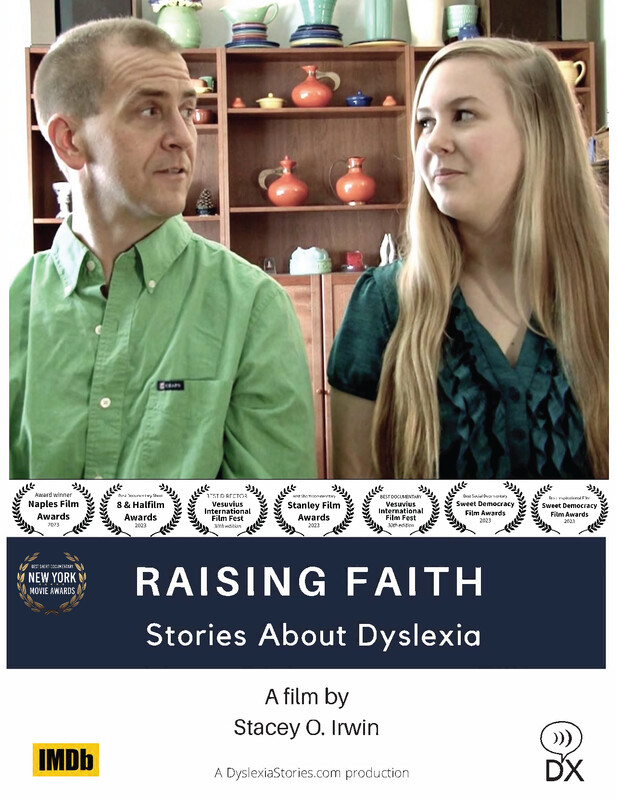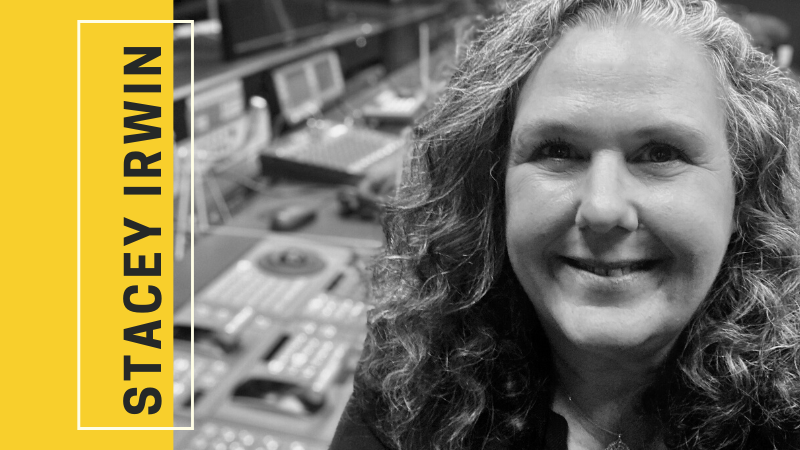Stacey Irwin
Stacey Irwin has been creating all kinds of video and audio content since she was a little girl. She entered her first audio documentary contest when she was eleven. She has been a media production professor in higher education for thirty years, teaching television, film and radio production, writing, and editing, first at Towson University near Baltimore, Maryland, and now at Millersville University, near Lancaster, Pennsylvania, USA. Stacey feels that producing her own work allows her to be the best educator she can be. "When you are practicing your craft with passion, it inspires students to use their voices to tell their stories in a more authentic way." This is what drives Stacey's work.
Your project has entered in our festival. What is your project about?
Raising Faith ~ Stories About Dyslexia is a short documentary that shares real talk from nine families with dyslexic children. The film is set in the homes of families who share poignant stories, advice, strategies and struggles from experiencing the learning difference called dyslexia. This film provides hope, inspiration, and a feeling of camaraderie for families of unique learners, and those who wish to open themselves to learning new things about neurodiverse individuals. The film also discusses the genetic component of dyslexia through the experiences of Faith, a young dyslexic learner, her father, and others. Ability advocates, unique learners, and those who know and love them, will feel "heard and seen" by the end of this film. The film raises faith about dyslexic life, as Faith's parents raise her.
Your project has entered in our festival. What is your project about?
Raising Faith ~ Stories About Dyslexia is a short documentary that shares real talk from nine families with dyslexic children. The film is set in the homes of families who share poignant stories, advice, strategies and struggles from experiencing the learning difference called dyslexia. This film provides hope, inspiration, and a feeling of camaraderie for families of unique learners, and those who wish to open themselves to learning new things about neurodiverse individuals. The film also discusses the genetic component of dyslexia through the experiences of Faith, a young dyslexic learner, her father, and others. Ability advocates, unique learners, and those who know and love them, will feel "heard and seen" by the end of this film. The film raises faith about dyslexic life, as Faith's parents raise her.

What are your ambitions with your project?
This film is an advocacy film for sure, and a resource for parents and families, but as Faith's Mother, I was also making meaning for myself, as a parent, as I tried to understand the dyslexic experience from my daughter and my husband. Documentary is such a meaningful genre for exploring the lived experience. I just want as many people to see it, as possible, so more people can understand the learning difference called dyslexia.
Tell us something about your shooting? What pleasantly surprised you?
It was very interesting working with my daughter, Faith. She did most of the interviews and helped create the final edit. She helped ensure that the right story was told because we were representing an experience I did not have, but she did. She was my authenticity compass. I was surprised at how well we worked together as a mother-daughter production team.
For what group of spectators is your film targeted?
I think this film has several layers. The film can be an inspirational story about perseverance and hope, but also a film to help others learn more about the learning difference called dyslexia. Educators can also learn from the film. But truly, the heart of the film is for dyslexic children and their families, so they don't feel alone on the journey toward understanding how their child or children learn. We want this film to be hopeful so people can have Faith that things will get better.
Why should distributors buy your film?
I think that dyslexia is a compelling topic that a lot of people have an interest in learning more about. Literacy is so important. This film shares experiences through stories. It does not lecture the audience. It is educational, yes, but in an engaging way. Twenty percent, one-in-five people, are dyslexic learners. Their struggles deserve to be shared.
How would you specify your work? What characterizes your film?
I think that the film engages in inspirational storytelling through the short documentary genre.
Why did you decide to become a filmmaker?
Filmmaking is a kind of becoming. Each project teaches you something new about a subject and about yourself. I think that is exciting. I love to tell stories and teach stories as a media production educator. I have worked in all types of media, but this was my first independent short documentary. I wanted to try something new and stretch my wings in storytelling. It was a humbling experience to do all of the different components myself. Finding the narrative through hours and hours of interviews was exciting but also a struggle to be authentic in the storytelling. Each cut was very considered. I also learned that I love directing.
Who is your role model?
I have many role models as a filmmaker. I am inspired by the Hello Sunshine production company and mission and Reese Witherspoon's part in that. I love the way the production company puts women at the center of the stories they produce and that they diversified to short series, scripted and unscripted media, and podcasts. Their collaborative model is motivating. I am also inspired by experimental filmmaker Maya Deren. Her ability to create experiences through film was stunning. And I have always been interested in film editors like Thelma Schoonmaker and Dede Allen. They are two of my favorites.
Which movies are your favorites? Why?
I like movies of all kinds. I really can't pick a genre. I think that if the story is compelling and makes me feel something, I'm in it until the end. And I always stay to watch the credits. These are my people.
Where do you look for inspiration for your films?
I think any visual or aural experience can help inspire filmmakers. A beautiful painting, an amazing song, a great meal, a good book, a garden, a great time with friends or traveling to new places, or retuning to places I love, are all inspirational to me.
Which topics interest you the most?
The world is full of so many interesting stories. I love learning how people persevere and then are rewarded for their effort.
What do you consider your greatest achievement in your career?
That is a tough one. The film has garnered twenty-two festival wins and that is super exciting, but I don't think my greatest achievement has happened yet. I'll have to wait and see.
What do you consider most important about filming?
It is very important to be prepared going in. And however much I thought I was prepared; I still missed some things that added time to my process. I also think that it is important to go off script so to speak, if something really good is happening. I can plan and plan, but in the end, I have to remember to be in the moment with the making of the film. Then it kind of feels like magic.
Which film technique of shooting do you consider the best?
I've always enjoyed Point of View shots and cross cutting between two narratives. Editing techniques add to the excitement and pacing of a film. I have studied film editors and really love to see the creativity editors use in their work. My PhD dissertation was on film editing.
How would you rate/What is your opinion about current filmmaking?
I think that there are more opportunities than ever for storytellers, and more places to share work than ever before. It is an exciting time to be in filmmaking. More people just need to give it a try. The sky is the limit.
What can disappoint you in a movie?
I like surprises in films. I like beautiful visuals with audio that aligns with it. I think that when all of the filmic elements join together in aid of the storytelling, the results are beautiful. I am disappointed when a film is one-sided in its presentation or there are technical mistakes like poorly recorded audio.
Who supports you in your film career?
My family. . . my husband and kids have all helped along the way, with ideas, being part of my projects, or even holding a mic or lights along the way. In independent filmmaking, anyone can become your crew.
What are the reactions to your film? (opinion of spectators, film critics, friends and family)
I am so honored when people watch the film and share that their experience was named in the film. And that they feel more hopeful about their child, who is a dyslexic learner, than they did before seeing the film. People have also shared that it dispels some of the stereotypes or misnomers about dyslexia. When I screen the film with college education majors, their often share their personal learning struggles so the film is a good conversation starter and helps people be vulnerable and examine their own educational experiences. It is like the film is part of a whole conversation. That is lovely.
Have you already visited any of the prestigious film festivals?
I had a wonderful experience at the Waco Family and Faith Film festival in early 2023, in Waco, Texas, USA. We had a live screening and a talk back after the screening and it was such an inviting and professionally planned film festival. I highly recommend it. I have not been to many others but hope to someday.
What are your future plans in filmmaking career?
I am currently raising funds for another documentary about a different side of dyslexia. I do not think that this story is finished. I have learned about something called the "school to prison pipeline," and dyslexia's roll in incarceration illiteracy. I have met so many people involved in dyslexia advocacy and dyslexia awareness that I think I have more to share on this topic. I'm working on raising funds for the project.

